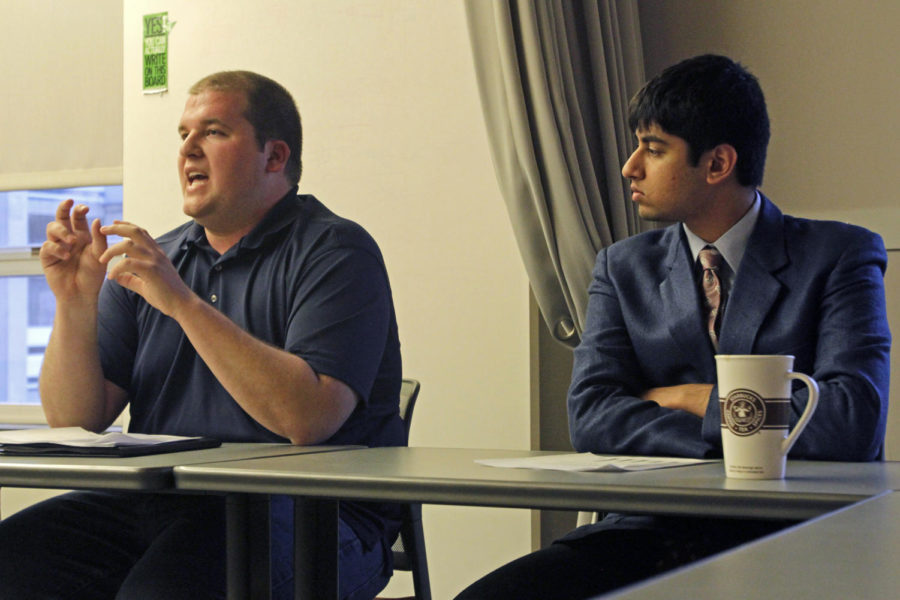Hughes vetoes clinic funds, suggests new student service
Kyle Schlichitng/Iowa State Daily
Spencer Hughes and Abhijit Patwa discuss the role that the Government of the Student Body will play in Financial Counseling Services in the next academic year. The meeting took place at the Multicultural Center on April 1 in the Memorial Union.
April 1, 2014
The Government of the Student Body budget for the 2015 fiscal year was vetoed by GSB President Spencer Hughes on Monday, March 31. The veto denies the request for funds by the Financial Counseling Clinic for the 2015 fiscal year.
The Financial Counseling Clinic is funded by GSB and offers financial counseling services to ISU students free of charge, as well as to members of the community for a small fee.
At the second of three informational sessions held on Tuesday, April 1, Hughes discussed his reasons for making the decision to veto the funds request with senate members.
“I’m glad that we’re able to have a conversation about this,” Hughes said.
He cited the clinic’s decline in appointments as his main concern and compared this year’s numbers with statistics from previous years. As of March 6, the clinic has had 105 appointments for counseling.
That number equates to about 29 percent of the five-year average pace for March 6, according to statistics.
In the 2012-2013 fiscal year, the clinic serviced 756 students.
Hughes calculated that at its current pace the clinic would likely only serve 154 students during the 2014 fiscal year.
Hughes said that the decline in appointments may correlate with the clinic’s decision to shift its method of counseling.
“This change was made rather abruptly, and without consulting GSB,” Hughes said.
The clinic, which is directed by Jonathan Fox and staffed by three professional counselors, recently switched their counseling method from professional counseling to peer-based counseling.
“The financial counseling clinic has always been and was always meant to be a professional service for students,” Hughes said.
Hughes made it clear that he is not concerned with the method of counseling involved, but rather with the way that the funds that GSB provides the clinic are allocated.
The new counseling method requires the professional counselors at the clinic to train students from the human development family sciences college in financial counseling methods.
“I don’t think that we should be paying for training the students,” Hughes said.
Hughes’ solution for the situation involves establishing a new “ideal clinic” for financial counseling with the Office of Student Financial Aid. The new clinic would use the $117,000 that are currently allocated for the financial counseling clinic.
The financial aid office has offered to pay the rest of what is needed to establish and run the new clinic.
The current financial counseling clinic would continue to exist as a part of the human development family studies department funded by the College of Human Sciences.
Hughes believes that the two clinics could coexist on campus. He said that the new clinic established with the SFA would provide services to students only, and the current financial counseling clinic would be able to provide a “unique, at-large service to the community.”
Following Hughes’ presentation several student senators in attendance asked questions. The concerns ranged from what will happen to the employees of the current clinic and the details on how the new clinic would be created.
“I think it’s an interesting solution,” said Aimee Burch, a student senator on the public relations committee.
The staff at the financial counseling clinic office were unable to comment on the situation. A member of the financial counseling clinic staff will be attending the GSB meeting Wednesday night to learn more about the situation and how it will affect their office.
There will be a third and final public information session concerning the financial counseling clinic at 4 p.m. Wednesday, in room 3538 at the Memorial Union.
“I’m going to do some more thinking and research tonight before the meeting,” Burch said.
The GSB will meet at 7 p.m. Wednesday in the Memorial Union to vote on the budget.







